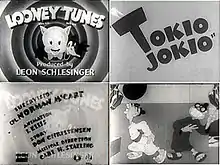Tokio Jokio
Tokio Jokio is a 1943 Looney Tunes propaganda short directed by Norman McCabe.[1] The cartoon is notorious and controversial for its racist depictions of Japanese people.This is also noted for being the final Norman McCabe cartoon.[2][3]
| Tokio Jokio | |
|---|---|
 Original black and white title cards & film frame | |
| Directed by | Cpl. Norman McCabe |
| Produced by | Leon Schlesinger |
| Story by | Don Christensen |
| Starring | Mel Blanc |
| Music by | Carl W. Stalling |
| Animation by | I. Ellis |
| Color process | Black-and-white |
Production company | |
| Distributed by | Warner Bros. Pictures The Vitaphone Corporation |
Release date | May 15, 1943 |
Running time | 7 minutes |
| Language | English |
Synopsis
Set within the framework of a newsreel from Japanese cinema that was captured by American troops during World War II, each segment features a separate story on Japanese life and the war effort. Each segment ends up showing the Japanese and their Axis allies as incompetent, pathetic, self-destructive failures. The cartoon also features cameos of Isoruku Yamamoto (despite the cartoon having been released after his death), Masaharu Homma, Hideki Tojo, Adolf Hitler, Benito Mussolini, Rudolf Hess, and Lord Haw-Haw.[4]
Status
Tokio Jokio is one of the 122 Warner Bros. animated shorts identified as having not had its copyright renewed in 1971 and is thus in the public domain in the United States.[5]
References
- Beck, Jerry; Friedwald, Will (1989). Looney Tunes and Merrie Melodies: A Complete Illustrated Guide to the Warner Bros. Cartoons. Henry Holt and Co. p. 141. ISBN 0-8050-0894-2.
- Behnken, Brian D.; Smithers, Gregory D. (2015). Racism in American Popular Media: From Aunt Jemima to the Frito Bandito. ABC-CLIO. pp. 107–108. ISBN 9781440829772. Retrieved 13 June 2020.
- https://www.lambiek.net/artists/m/mccabe_norm.htm
- https://www.lambiek.net/artists/m/mccabe_norm.htm
- Looney Tunes in the Public Domain at the Wayback Machine (archived March 26, 2016), based upon Film Superlist: Motion Pictures in the U.S. Public Domain by Walter E. Hurst.
